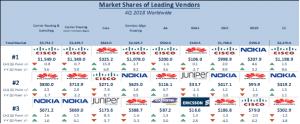Seasonality Hitting 1Q19 Worldwide Service Provider Router and Switching Market
Routers and switches will continue to be in demand but will be delivered in different form factors, from purpose-built to virtualize versions
Routers and switches will continue to be in demand but will be delivered in different form factors, from purpose-built to virtualize versions.”
GILBERT , ARIZONA, USA, June 12, 2019 /EINPresswire.com/ -- ACG Research released its 1Q 2019 worldwide Routing and Switching market share report. The worldwide Routing and Switching market decreased quarter over quarter 20.6% and 0.3% year over year. The core routing segment took a hit with revenue of $678, down from 4Q at $824 million. The edge/switching segment also declined, posting revenue of posting revenue of $2.29 billion, down from $2.9 billion in the fourth quarter. Regionally, APAC decreased revenue 25.2% q-q and 5.2 y-y. The EMEA region was down significantly, 19.5% q-q and 2.1% y-y. The Americas also decreased 16.7% q-q but increased 5.8% y-y. — Ray Mota
Service providers and large enterprises are dealing with significant challenges with their network infrastructures and operations, which are expanding quickly and becoming more complex. IP/MPLS networks have become operation intensive because of their complex implementations. Additionally, service providers feel the added pressure of falling revenues and stiff competition by the over-the-top providers as well as the challenge to innovate to keep pace. These drivers make the network owners think about a transport technology that can provide convergence across layers, domains and offload the complexities in the networks, today.
Service providers are beefing up their backhaul to prepare for 5G and MEC architectures, but automation in NFV must be accelerated them to simplify and unify the transport layer technology that enables IP/MPLS and IPV6 networks to run more naturally and scale more quickly.
“Routers and switches will continue to be in demand but will be delivered in different form factors, from purpose-built to virtualize versions. Service providers and large enterprises are negotiating new challenges: the network infrastructure, fast growth in operations and extreme complexity,” says Ray Mota, CEO. “IP/MPLS networks have become operation intensive because of their complex implementations. Service providers also must deal with decreasing revenues and aggressive competition by the over-the-top providers all the while trying to innovate. These drivers are making the network owners think about a transport technology that can provide convergence across layers, domains and offload the complexities in the networks.”
TREND and DRIVER HIGHLIGHTS
• Vendors’ revenue profiles are being driven by operators migrating to new architectures as well as intensified pricing pressure.
• Automation in NFV needs to be accelerated in order for SPs to simplify and unify the transport layer technology that enables IP/MPLS and IPV6 networks to run more naturally and scale more quickly.
• Without policies and automation in place, providers risk increasing the complexities of their network, which will drive opex cost up. SPs need to eliminate the resource-heavy signaling protocols of MPLS and move intelligence to the source/edge of the traffic, thus removing complexity from the network.
For more information about ACG’s routing and switching services contact sales@acgcc.com.
ACG Research
email us here
info@acgcc.com
+1 408-200-0967
Visit us on social media:
Facebook
Twitter
LinkedIn
Legal Disclaimer:
EIN Presswire provides this news content "as is" without warranty of any kind. We do not accept any responsibility or liability for the accuracy, content, images, videos, licenses, completeness, legality, or reliability of the information contained in this article. If you have any complaints or copyright issues related to this article, kindly contact the author above.

